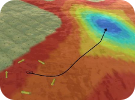SPEEDD
Partners: Demokritos (Agia Paraskevi, Greece), IBM — Israel (Haifa, Israel), ETH (Zürich, Switzerland), Technion (Haifa, Israel), University of Birmingham (England), Feedzai (Coimbra, Portugal)
Contact: Carlos Canudas de Wit ![]()
PhD students: Pietro Grandinetti ![]() , Andrés A. Ladino Lopez
, Andrés A. Ladino Lopez ![]()
Official website: SPEEDD
Eliminating or mitigating an anticipated problem, or capitalizing on a forecast opportunity, can substantially improve our quality of life, and prevent environmental and economic damage. At the environmental level, changing traffic-light priority and speed limits to avoid traffic congestions will reduce carbon emissions, optimize transportation and increase the productivity of commuters. At the business level, making smart decisions ahead of time can become a differentiator leading to significant competitive advantage. For example, adding credit cards to watch lists as a result of forecasting fraud will reduce the cost inflicted by fraudulent activities on payment processing companies and merchants, and consequently lower credit card rates which can attract more customers.
SPEEDD will develop a prototype for proactive event-driven decision-making: decisions will be triggered by forecasting events — whether they correspond to problems or opportunities — instead of reacting to them once they happen. The decisions will be in real-time, in the sense that they will be taken under tight time constraints, and require on-the-fly processing of big data, that is, extremely large amounts of noisy data flooding in from different geographical locations, as well as historical data. In credit card fraud management, for example, it is necessary to forecast and act upon fraudulent activity in a matter of milliseconds, given tens of thousands of transactions per second taking place all over the world, as well as several months of historical data.
SPEEDD will develop a prototype for robust forecasting and proactive decision-making, in the sense that it will be resilient to the inherent uncertainty of big data, which include incomplete data streams, erroneous data and imprecise definitions (patterns) of the events that need to be detected and forecast. In traffic congestion forecasting and management, for instance, the data come from motorway sensors that are often out of order, not calibrated appropriately or inaccurate.
The SPEEDD methodology for proactive event-based decision-making comprises the following steps. First, big data is continuously acquired from various types of sensor and fused in order to recognise, in real-time, events of special significance. To allow for sub-second recognition, SPEEDD minimizes communication volume by moving as little data as possible from one place to another. Second, the events recognised are correlated with historical information to forecast problems and opportunities that may take place in the near future. Third, the forecast events along with the recognised events are leveraged for real-time operational decision-making. Fourth, visual analytics tools prioritise and explain possible proactive actions, enabling human operators to reach and execute the correct decision.
The novelty of SPEEDD, therefore, lies in the difficult task of on-the-fly, low-latency processing of extremely large, geographically distributed, noisy event streams and historical data, for recognising and forecasting opportunities and threats, making decisions to capitalise on the opportunities and mitigate the threats, and explaining, through user-interaction, the decisions to human operators in order to facilitate correct decision execution.



















